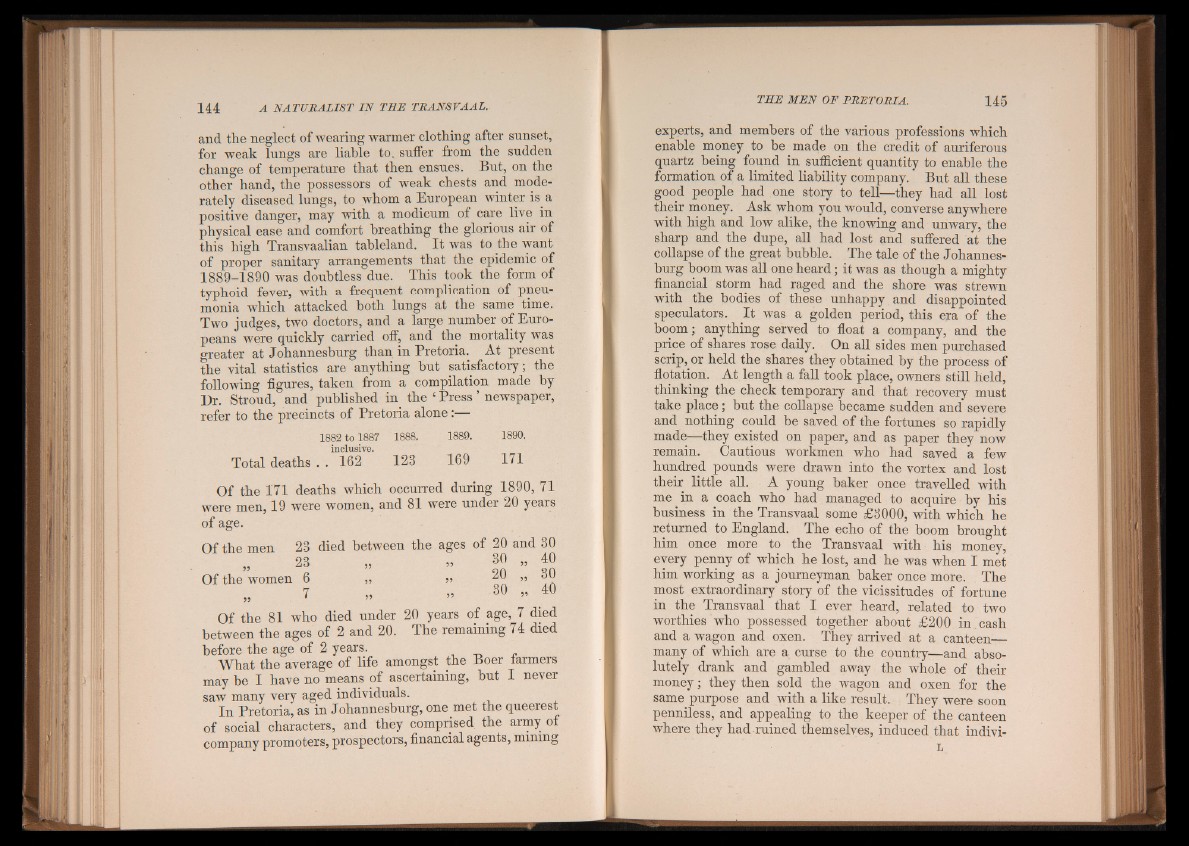
and the neglect of wearing warmer clothing after sunset,
for weak lungs are liable to. suifer from the sudden
change of temperature that then ensues. But, on the
other hand, the possessors of weak chests and moderately
diseased lungs, to whom a European winter is^ a
positive danger, may with a modicum of care live in
physical ease and comfort breathing the glorious air of
this high Transvaalian tableland. It was to the want
of proper sanitary arrangements that the epidemic of
1889-1890 was doubtless due. This took the form of
typhoid fever, with a frequent complication of pneumonia
which attacked both lungs at the same time.
Two judges, two doctors, and a large number of Europeans
were quickly carried off, and the mortality was
greater at Johannesburg than in Pretoria. At present
the vital statistics are anything hut satisfactory; the
following figures, taken from a compilation made by
Dr. Stroud, and published in the I Press ’ newspaper,
refer to the precincts of Pretoria alone
1882 to 1887 1888. 1889. 1890.
inclusive.
Total deaths . . 162 128 169 171
Of the 171 deaths which occurred during 1890, 71
were men, 19 were women, and 81 were under 2 0 years
of age.
Of the men 28 died between the ages of 20 and 30
23 „ ^ 0 » 4 0
Of the women 6 „ . » 20 „ 30
7 „ „ -30 „ 40
Of the 81 who died under 20 years of age, 7 died
between the ages of 2 and 20. The remaining 74 died
before the age of 2 years.
What the average of life amongst the Boer farmers
may be I have no means of ascertaining, but I never
saw many very aged individuals.
In Pretoria, as in Johannesburg, one met the queerest
of social characters, and they comprised the army of
company promoters, prospectors, financial agents, mining
experts, and members of the various professions which
enable money to be made on the credit of auriferous
quartz being found in sufficient quantity to enable the
formation of a limited liability company. But all these
good people had one story to tell—they had all lost
their money. Ask whom you would, converse anywhere
with high and low alike, the knowing and unwary, the
sharp and the dupe, all had lost and suffered at the
collapse of the great bubble. The tale of the Johannesburg
boom was all one heard; it was as though a mighty
financial storm had raged and the shore was strewn
with the bodies of these unhappy and disappointed
speculators. It was a golden period, this era of the
boom; anything served to float a company, and the
price of shares rose daily. On all sides men purchased
scrip, or held the shares they obtained by the process of
flotation. At length a fall took place, owners still held,
thinking the check temporary and that recovery must
take place; but the collapse became sudden and severe
and nothing could be saved of the fortunes so rapidly
made—they existed on paper, and as paper they now
remain. Cautious workmen who had saved a few
hundred pounds were drawn into the vortex and lost
their little all. A young baker once travelled with
me in a coach who had managed to acquire by his
business in the Transvaal some £3000, with which he
returned to England. The echo of the boom brought
him once more to the Transvaal with his money,
every penny of which he lost, and he was when I met
him working as a journeyman baker once more. The
most extraordinary story of the vicissitudes of fortune
in the Transvaal that I ever heard, related to two
worthies who possessed together about £ 2 0 0 in.cash
and a wagon and oxen. They arrived at a canteen—
many of which are a curse to the country—and absolutely
drank and gambled away the whole of their
money; they then sold the wagon and oxen for the
same purpose and with a like result. They were soon
penniless, and appealing to the keeper of the canteen
where they had ruined themselves, induced that indivi-
L